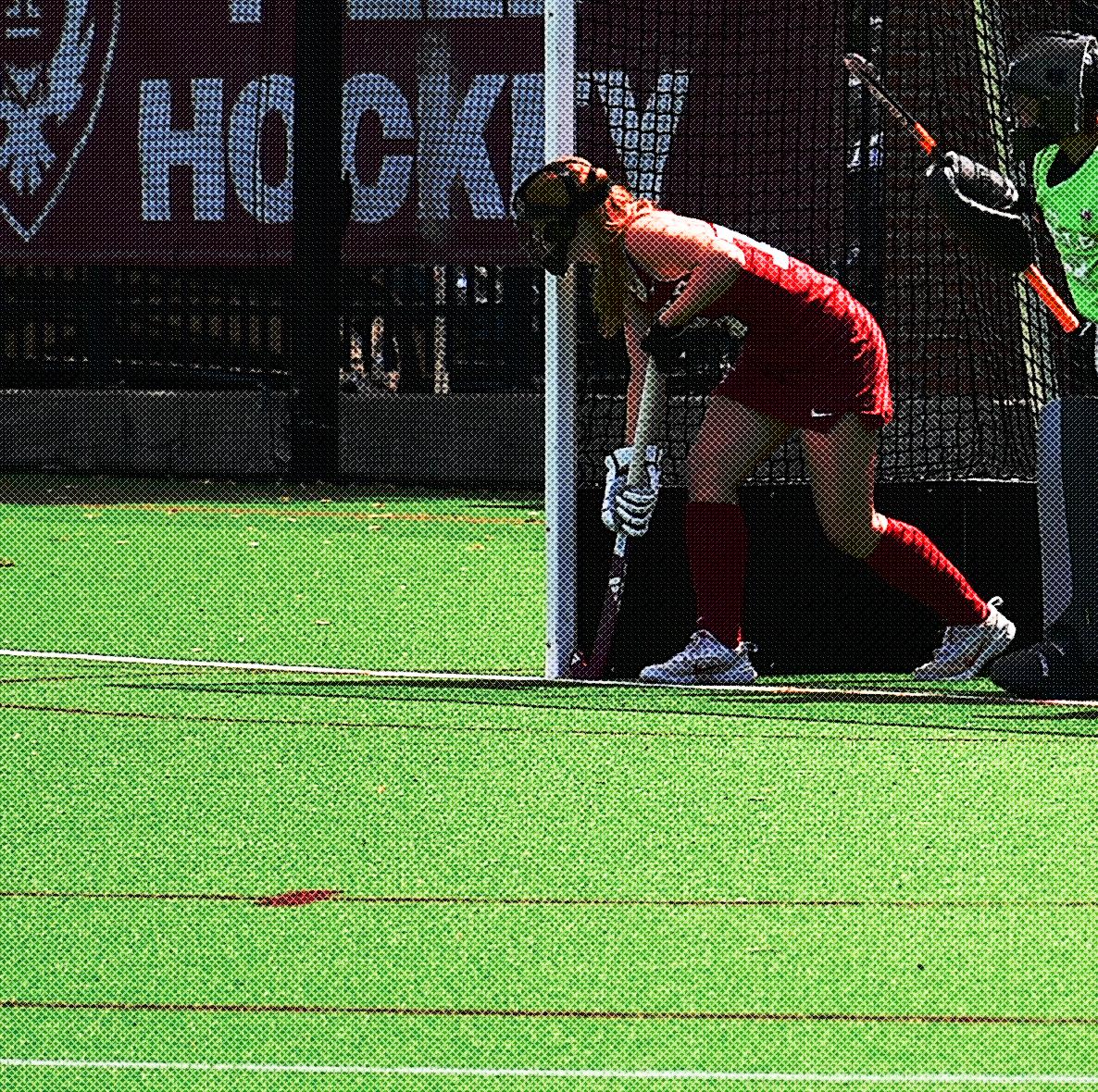THE TEMPLE NEWS
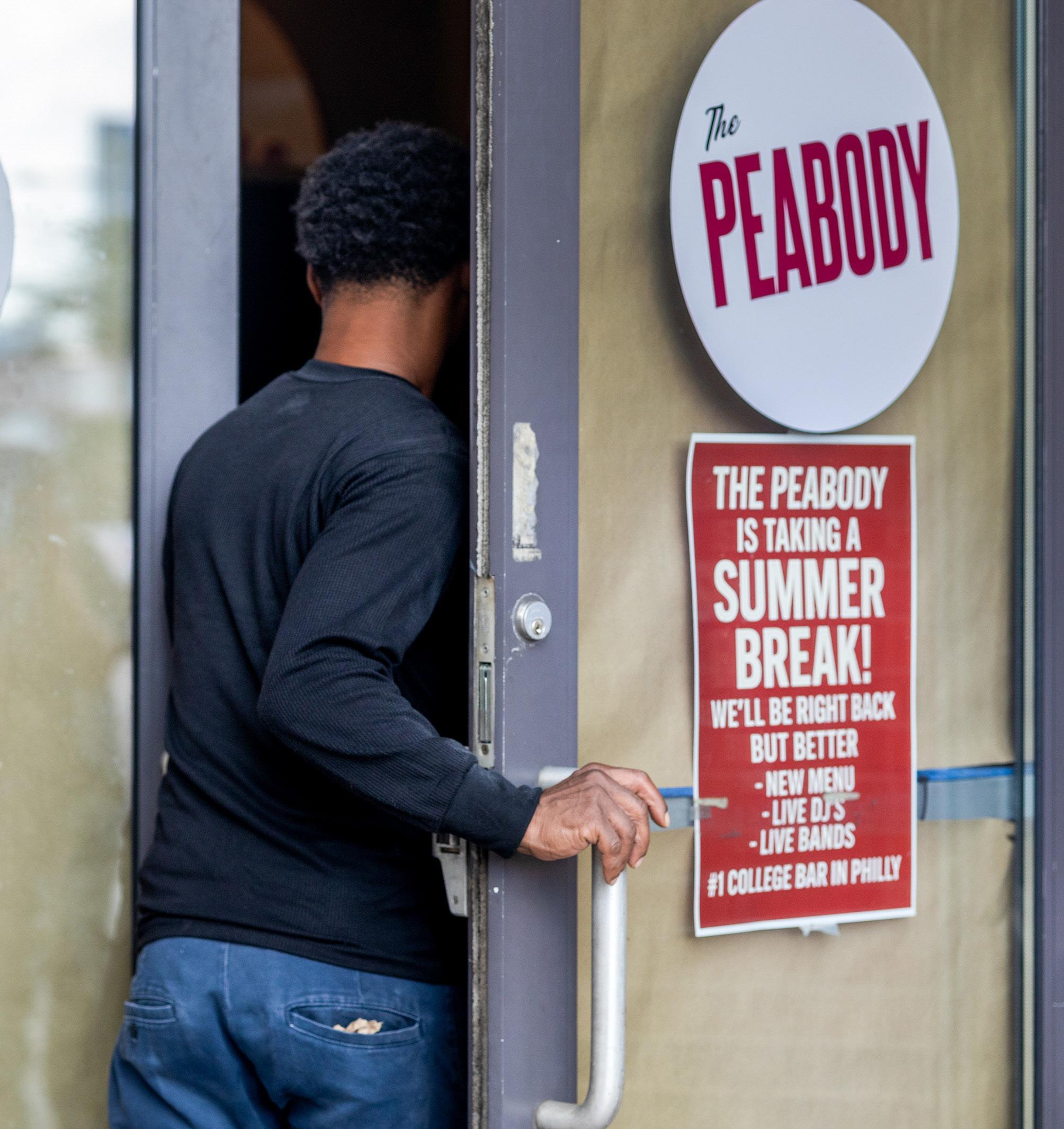


The storied campus bar has been through renovation purgatory for years. Its new owner hopes to open in a month.
Read more on Page 16.
WHAT’S INSIDE NEWS, Page 4
Another years-delayed project, Temple Women and Families Hospital, opened last week.
OPINION, Page 8
Opinion editors argue for students to separate self-care from consumerism.
VOL 104 // ISSUE 2 TUESDAY, SEPTEMBER 9, 2025
Sidney Rochnik Editor-in-Chief
Valeria Uribe Managing Editor
Anna Augustine Managing Editor
Ryan Mack Copy Editor
Bradley McEntee Copy Editor
Sophia Levine News Editor
Nathan Horwitz Assistant News Editor
Connor Pugh Assistant News Editor
Caelan O’Neill Opinion Editor
Wania Irfan Assistant Opinion Editor
Madelynne Ferro Features Editor
Benjamin Dipalma Assistant Features Editor
Sienna Conaghan Co-Sports Editor
Colin Schofeld Co-Sports Editor
Jacob Moreno Assistant Sports Editor
Leah Duffy Investigations Editor
Julia Anderson Director of Audience Engagement
Nathaniel Thrush Co-Community Engagement Coordinator
Kayla McMonagle Co-Community Engagement Coordinator
Isabella Farrow Audience Engagement Editor
Nalani Chiles Audience Engagement Editor
Xavier Johnson Sports Engagement Editor
Brian Nelson Photo Editor
Lillian Prieto Assistant Photo Editor
Aidan Gallo Assistant Photo Editor
Ava Campbell Multimedia Editor
Jeremy Shover Assistant Multimedia Editor
Jack Larson Print Design Editor
Daniya Eggleston Graphic Design Editor
Chili Ramgolam Data Editor
Ariana Droz Podcast Editor
Sage Spohn Newsletter Editor
Nadia Bodnari Web Editor
Maria Lombana Advertising Manager
Aaliyah Abdur-Rashid Advertising Manager
The Temple News is an editorially independent weekly publication serving the Temple University community.
Unsigned editorial content represents the opinion of The Temple News.
Adjacent commentary is refective of their authors, not The Temple News.
The Editorial Board is made up of The Temple News’ Editor-inChief, Managing Editors, Chief Copy Editor, Deputy Copy Editor, News Editor and Opinion Editors. The views expressed in editorials only refect those of the Board, and not of the entire Temple News staff.
ON THE COVER
The Peabody on Sept. 7. AIDAN GALLO / THE TEMPLE NEWS
Visit us online at temple-news.com
Email section staff news@temple-news.com letters@temple-news.com features@temple-news.com sports@temple-news.com
The Temple News is located at: Student Center, Room 243 1755 N. 13th St. Philadelphia, PA 19122
In the print issue on Aug. 26, Santiago Ortiz was misstated as a marketing major instead of a fnance major. Additionally, the headline for an article on Owls for Philly incorrectly implied that employees get paid through the program.
Accuracy is our business, so when a mistake is made, we’ll correct it as soon as possible. Anyone with inquiries about content in this newspaper can contact Editor-in-Chief Sidney Rochnik at editor@temple-news.com.
3
Mask regulations were added, along with examples of bias, on the ADL’s recommendations.
BY NATHAN HORWITZ Assistant News Editor
Temple updated its Student Conduct Code and Policy for Preventing and Addressing Discrimination and Harassment to provide specifc examples of behaviors the university considers discriminatory and added regulations regarding the use of face coverings, President John Fry announced in an Aug. 25 statement.
The changes refected recommendations from the Anti-Defamation League, an organization focused on combating antisemitism and other forms of bigotry.
“As we routinely do during the summer, university personnel spent time reviewing existing policies, regulations and guidelines,” a university spokesperson wrote in a statement to The Temple News. “Antisemitism and anti-Israeli bias has been on the rise in many communities. While these changes refect the Anti-Defamation League’s recommendations, they also refect the continued eforts of university administrators to curb the rise of antisemitism and ensure that our community remains inclusive.”
The Student Conduct Code update includes an “Identity Concealment” rule, prohibiting students from wearing masks with intent to intimidate any person or group or for the purpose of evading identifcation while violating the law or university policy.
Masks and face coverings worn for health reasons or religious purposes are still permitted, a university spokesperson told The Temple News.
The updated policy also provides specifc examples of prohibited bias, specifcally referring to antisemitism, Islamophobia, anti-Israeli, anti-Arab, anti-Asian and anti-Mexican discrimination and harassment.
Temple’s policy considers bias-related intimidation and harassment to
be behavior directed at a person or group, motivated by their membership to a protected category. Inficting severe emotional distress, disrupting university operations, creating a hostile environment or causing someone to reasonably fear the threat of physical, emotional or property harm, constitutes a violation.
The recommendations from ADL were a part of the organization’s Campus Antisemitism Report Card program, which assessed 135 universities based on 30 levels of criteria through a series of surveys and secondary research. The reports are split into three categories: Jewish Life on Campus, Administrative Policies and Campus Conduct and Climate Concerns.
Temple obtained passing scores in the frst two categories, however, due to a high level of concern around conduct and climate, Temple received a C and a “Corrections Needed” grade overall. The report card stated that, per capita, Temple had a high level of antisemitic and anti-Zionist incidents, hostile anti-Zionist groups and anti-Zionist staf and faculty activity.
The Campus Antisemitism Report Card was created to gauge the climate for Jewish students on college campuses following the Oct. 7 attack on Israel. According to the ADL, grades were determined using objective data, subjective interpretations and the organization’s own beliefs about how to weigh various factors.
“Our ofce communicates and engages with several administrators at Temple University about a variety of topics, including the report card,” wrote Andrew Goretsky, senior regional director for ADL Philadelphia, in an email to The Temple News.
Since releasing their frst report card in 2024, a majority of the evaluated schools have consulted with the ADL to support Jewish life on campus and address antisemitism, Goretsky wrote.
Members of Temple Action Solidarity Coalition, a coalition that includes Jewish Voice for Peace, engaged in a protest Sept. 4, after these guideline changes. Organizers encouraged demonstrators

to wear masks despite the conduct code update, but identity concealment would have been recommended regardless of the changes, according to the co-president of JVP, who requested to remain anonymous.
The demonstrators were told to wear masks for their safety, not for the purpose of engaging in harassment or intimidation, the JVP’s co-president said. While the co-president sees how the conduct changes can be interpreted positively, they believe Temple has chosen to misconstrue the nature of previous pro-Palestine protests on campus.
In recent months, the Trump administration has revoked thousands of student visas. Across the nation, hundreds of these revocations were directly linked to student participation in pro-Palestine protests.
“Protestors have been photographed and doxxed when they have their faces open,” the JVP co-president said. “These are civilian people who are expressing
their First Amendment right.”
Mark Leuchter, a religion professor and Director of the Jewish Studies program, has lost confdence in the ADL in recent years due to their judgements, including their broad stance on anti-Zionism. He believes it is not tenable to equate all anti-Zionism to antisemitism, as there are varieties of both Zionist and anti-Zionist ideologies.
“If you’re not drawing distinctions, if you’re not delineating where you draw the distinctions, it’s very easy to paint with a broad brush to support your critique or to support your agenda,” Leuchter said.
Nathan.horwitz@temple.edu
CAMPUS The hospital opened on Wyoming Avenue, dedicated to obstetrics and neonatal care.
BY CONNOR PUGH Assistant News Editor
The Temple Women and Families Hospital in Frankford opened its inpatient services to serve North Philadelphia on Wednesday Sep. 3.
The hospital was initially slated to open January 2025 but faced signifcant delays in refurbishing and renovation to accommodate new facilities at the hospital. Difculties in building new Neonatal Intensive Care Units further delayed in-patient services before then.
The new hospital is dedicated to facilities supporting women’s health and childbirth care, featuring facilities for OB/GYN services, NICU and operating rooms for same-day surgeries.
Located on Wyoming and Castor Avenues, the Temple Women and Families lies near Juniata Park and is blocks away from the Market-Frankford line. The hospital’s site used to house the Cancer Treatment Centers of America.
“You can imagine that the design on the interior of a cancer hospital doesn’t fully match the needs of the design that you would want for women’s health and infant care,” said Sharon Kurfuerst, executive director of Temple Women and Families.
When the hospital opened Wednesday, all delivery and labor services in the Temple Health System moved to Temple Women and Families. Outpatient services opened at Women and Families in April 2023. The hospital’s surgery and radiology departments were also in service ahead of the full opening.
The updated facilities at Temple Women and Families for childbirth and maternity care contain more comfortable spaces than previous obstetric care spaces at Temple Health Main Campus, Kurfuerst said.
Specifcally, the new location provides more room and privacy to patients and babies in NICU care. The hospital

contains 32 private maternity rooms, 41 NICU beds and 13 labor rooms for obstetric care.
“It will help families heal in dignity, with privacy and bonding time, and support while breastfeeding,” said Cynthia Armstead, a community doula in North Philadelphia.
Temple Women and Families hospital provides mental health support alongside OB/GYN service, including integrated consulting for psychiatric and counseling services for post-partum depression.
Temple Women and Families’ opening launched the Perinatal Collaborative Behavioral Health Care Program, which integrates psychiatrists, clinical workers and social workers directly into the care service of pregnant and post-partum patients.
Temple Mama Model is another new mental support program hosted within the hospital. Vulnerable patients are paired with a dedicated perinatal community health worker throughout the pregnancy process until one year post-partum.
“We know that women tend to de-
lay, sometimes, getting mental health support,” Kurfuerst said. “This will allow them to be able to do that all-in-one location that’s safe and really focused on their holistic healthcare needs.”
The hospital provides essential OB/ GYN care to its patients with the greatest need in the Temple Health system.
Around 70-75% of women under care by the Temple Health system live in the zip codes closest to the new location, according to Temple Health studies.
In addition to convenience, the opening attempts to address the lack of facilities for maternal care within the city. There are only six other maternity units in Philadelphia.
The maternity wards that have not been shuttered remain spread thin throughout the city, leaving patients seeking help with long distances to travel to get proper care. Philadelphia sufers from national systemic racial gaps in medical care for women and childbirth in the United States. Black women in the U.S. are three times more likely to die from pregnancy and childbirth related causes, according to the Center for Disease Control and Prevention.
Assisting the services at Women and Families is the Maternal Health Dashboard, a service studying factors and trends for inequalities in maternal care and enabling specifc interventions to increase the health and safety of the mother and child.
Jenné Johns, president of Once Upon a Preemie, is a Temple graduate who founded the racial equity-focused organization after writing a children’s book of the same name to comfort black preemie families struggling with NICU care. Johns stressed the importance of combating existing racial gaps in prenatal and maternal care when opening new facilities for OB/GYN care.
“Temple’s Women and Families Hospital is a step in the right direction, as long as we continue to address and prioritize the social determinants of health that follow pregnant moms, newborns, and families with preterm infants who require care from the Neonatal Intensive Care Unit,” wrote Johns in an email to the Temple News.
@connor.pugh@temple.edu
CAMPUS PA State Grants are expected to be delayed as the state has not agreed on funding PHEAA.
BY SOPHIA LEVINE News Editor
In-state Temple students are expected to face delays in receiving the state grant money that covers tuition as the state budget impasse continues.
The Pennsylvania State Grant Program, administered through the Pennsylvania Higher Education Assistance Agency, distributes fnancial aid to students across the state. Nearly $15 million in fnancial aid cannot be provided to students without the state budget passed.
PHEAA determines how much aid a student should receive based on tuition prices, disability related costs and living expenses as outlined in their FAFSA application. PA State Grants are applied to a student’s account balance after the add/ drop period ends, according to Temple’s Student Financial Services website.
This year, the add/drop period for 16-week classes and 7-week courses ended on Sept. 8 and 2 respectively. As long as students do not receive their PA State Grant, they are ineligible to register for classes the following semester.
The delay will impact in-state students as the PA state grants will not disburse until a resolution is passed, Temple’s One Stop Student Financial Services team wrote in a statement to The Temple News. The ofce encouraged students relying on these funds to check the TUportal’s cost and aid section and their Temple emails for updates.
“The release of the funds depends on the commonwealth’s budget process,” the ofce wrote. “Temple will update students as soon as PHEAA confrms grant eligibility and sends funds.”
The grant delays can be attributed to how the state budget gets passed every year, said Michael Sances, a politcal science professor.
Compared to the federal government and other states who must pass

their budget all together, the Pennsylvania state legislature can pass their budget in pieces and has yet to approve PHEAA’s funding.
A state budget should have been passed by the deadline, on June 30. The Republican majority in the Senate and Democrat-controlled House of Representatives have put forward their own funding proposals and have not yet negotiated with the others’ plan.
“In the past couple of weeks, there’s been talk of a deal that’s pending,” Sances said. “But no one really knows, but they do have to pass a state budget at some point.”
The university is advocating in Harrisburg for timely funding and monitoring PHEAA transmissions. Financial holds will be placed on accounts when tuition is not paid by the Sept. 11 due date. Student Financial Services encouraged students relying on the funds
to contact the Bursar’s Ofce if their account is on hold to explore potential options.
Students have expressed worries about how the delays will afect them. Last year’s PHEAA application system changes prevented May Dukuly from attending her spring semester classes unless she paid $1,000 on her account. She has not encountered the same problems this year.
While Dukuly is worried about class enrollment in the Spring semester if funding is not passed, she’s hopeful the state legislature will reach an agreement before then.
“I am worried about the Spring semester,” said Dukuly, a junior psychology major. “Hopefully they fgure it out by then, I might be a little worried around that time.”
Sariah Rivera, a senior health professions major, said the state grant delays
will be disruptive because she relies on scholarships, federal and state money to help cover tuition.
Taking out another loan would add onto Rivera’s expenses, including her car and rent —and she would have to pay for the loan by herself.
“I would really try my best not to but if worst comes to worst,” Rivera said. “I do have good savings, but that would clear my savings if I had to pay for it.”
The One Stop Student Financial Services team acknowledged students could be anxious if they do not receive their PA state grant on time.
“It’s understandable to feel anxious,” the ofce wrote. “Temple plans for contingencies and will keep operations running and students informed.”
sophia.levine@temple.edu @sophia_levine
Temple Tomorrow’s Executive Ofce of Leadership shared plans for this academic year.
BY ANNA AUGUSTINE Managing Editor
Temple Student Government President Lourdes Cardamone and Vice President Janeese Hochstetler want to strengthen ties between students and university administration during the 2025-2026 academic year.
They hope to make TSG more active in the Temple community by holding tabling events, having an open-door policy to their ofce and connecting students to campus resources.
“We really want to emphasize that we’re here to represent students and bridge the gap between students and administration and staf and faculty,” Cardamone said. “Senior administration can often feel like they’re out of reach for students, but that’s not necessarily the case. We’re able to advocate on [student’s] behalf, and they’re able to come to us and chat with whatever issues that they’re having.”
Their campaign, Temple Tomorrow, also emphasized refning and increasing the university’s public safety infrastructure, strengthening connections between campus organizations and crisis response training for student organization leaders.
Their proposed crisis response instruction will include frst aid and sensitivity training. They will also instruct student leaders about on-campus resources like Tuttleman Counseling Services and the Wellness Resource Center.
TSG created a new position in their executive suite, the chief executive of equality, accessibility and wellness. The position aims to ensure the diverse student body is accurately represented and advocated for and will oversee initiatives like health equity and accessibility.
Temple Tomorrow also looks to revamp TSG’s Town Hall formats. In years past, the events have been similar to press conferences, but Cardamone
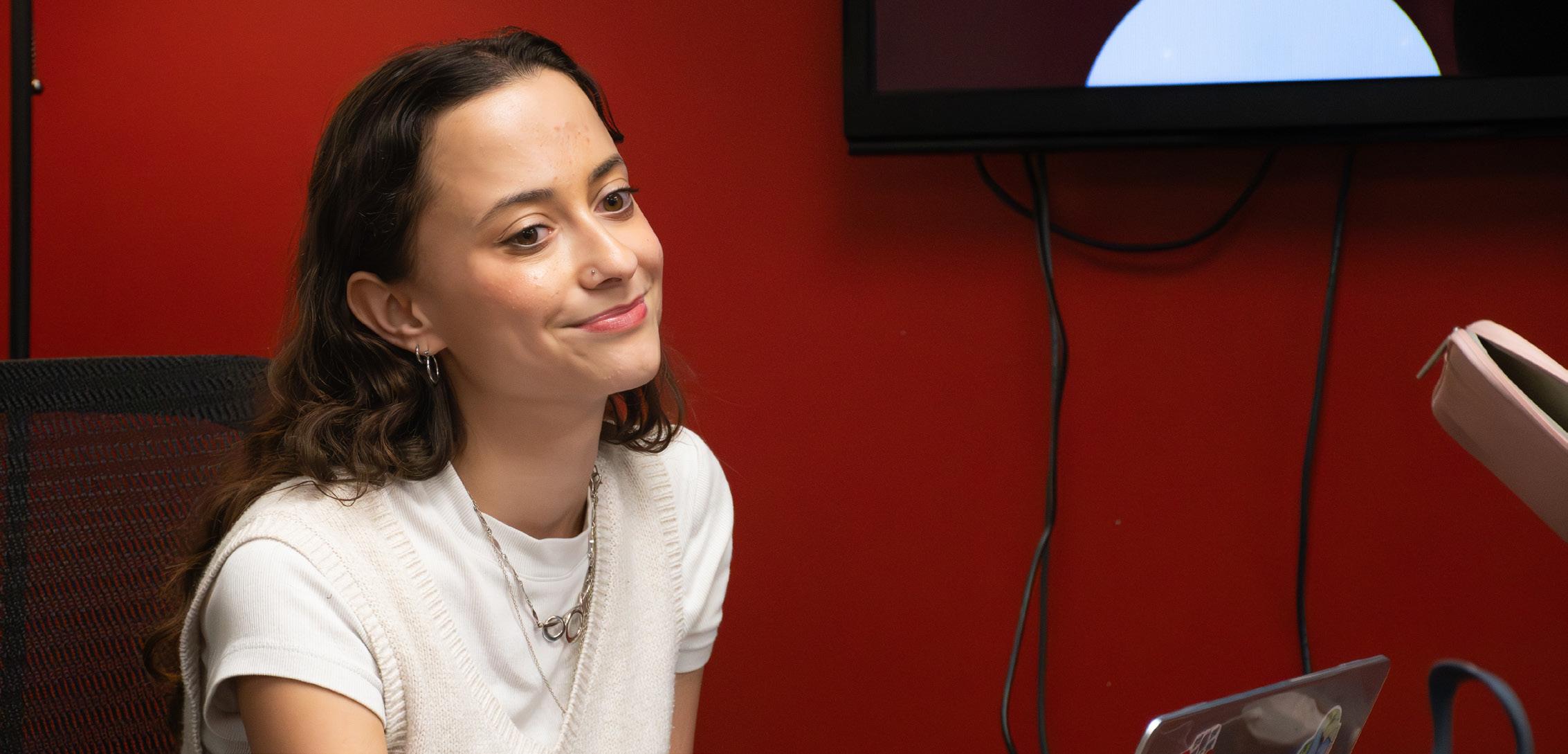
and Hochstetler hope to encourage more interaction by inviting student questions and criticism during the event. They hope to center the events around specifc topics and invite department chairs or relevant personnel for students to address directly.
They plan to hold their frst Town Hall Sept. 15.
“I think a big distinction of what we’re trying to do this year, opposed to years past, is not only the tabling, which hasn’t really been done on a large scale, but being there and putting TSG into the Temple community as a resource,” said Peyton Giordano, TSG’s chief of staf.
Similarly, the new TSG administration hopes to launch a student feedback form on their website, providing a space for students to submit their concerns or suggestions for improvement pertaining to the university. Cardamone and Hochstetler will take feedback to President John Fry during monthly meetings.
Cardamone and Hochstetler’s consistent meetings with Fry are another new initiative in the 2025-2026 academic year. They will discuss their plans for
new policies and programs directly with Fry, who will help determine if a project is feasible and point them in the right direction to execute it.
“We take a lot of the initiatives and ideas that we are workshopping or fully working on, either from our cabinet meetings or full-team meetings, and we take those to Fry,” Hochstetler said.
Another of TSG’s eforts to increase connectivity between university administration and the student body is tabling events. They plan to compile information about university safety, wellness and outreach initiatives and spread the word through on-campus events.
“If you walk into the Student Center and see us, we will have all the resources for you,” said TSG deputy chief of staf Caroline Kotch.
TSG has also connected students to on-campus organizations through their Instagram page, where they frequently share information about diferent clubs’ general body meetings and missions.
For smaller initiatives, Cardamone, Kotch, Hotchstetler and Giordano — TSG’s Executive Ofce of Leadership — will rely on their staf of students, who
they hired before the school year began. These positions include their director of basic needs, director of student afairs and director of allocations.
“We have a lot of directors that we’re going to be giving them guidance on what our goals are,” Kotch said. “But they will then draft initiatives, and then we’ll have to go through them, make sure that they do align, but we are here for the directors, and we will make sure that things get done in a timely matter.”
On the whole, Cardamone looks forward to establishing stronger ties both within the Temple community and between Temple and its surrounding neighborhood.
“We’re serving the students,” Cardamone said. “But we’re also serving the greater community, because Temple is in North Philadelphia, and this community has been here long before us, so it is important that we acknowledge that and unite.”
Sophia Levine contributed reporting.
annaaugustine@temple.edu
Temple has been the focal point of several investigations with the Department of Education surrounding antisemitic behavior on campus since December 2023.
e rst investigation conducted by the United States Department of Education’s Ofce of Civil Rights found Temple compliant in protecting Jewish students, according to a university statement. However, a er another investigation was launched earlier this year, Temple entered a voluntary resolution agreement with OCR.
e OCR conducted the initial investigation along with more than 100 other United States universities based on speculation of violations of Title VI of the Civil Rights Act, speci cally citing harassment based on shared national origin.
Temple was required to conduct a climate assessment within 60 calendar days of Jan. 15, according to the resolution agreement. e university had 30 days a er completing the analysis to submit the results, along with a proposal with initiative to guarantee the safety of the Jewish community.
Despite the time frame required of the OCR, the Temple community has yet to receive the ndings of the assessment. With recent administrative efforts to protect Jewish students and comply with third-party inquiries on antisemitism, the Temple administration should prioritize being transparent about the ndings of the OCR climate assessment.
e Editorial Board urges Temple to be more transparent about the incidents that were a focal point of the investigation and reveal the results of the cli-
mate assessment.
President John Fry brie y addressed the updates to the Student Code of Conduct in a statement released on Aug. 25. e changes include provisions based on recommendations from the Anti-Defamation League’s Antisemitism Report Card. Antisemitism and anti-Israeli discrimination are now explicitly referenced as prohibited.
With recent e orts to address outside concerns for Jewish students amongst the tempest of federal scrutiny, letting the public know the results of the internal climate survey is crucial to ensure concerns are being addressed appropriately.
e Blue-Ribbon Commission on Antisemitism is an organization of high-level experts who analyze complex problems and gives recommendations to institutions. Temple has taken several directives from the BRC to support the Jewish community.
Temple introduced the Ofce of Institutional Diversity, Equity, Advocacy and Leadership and the Division of Student A airs in 2021, as campus resources, based on the recommendations from the BRCA to prevent discrimination.
e administration has shown they are committed to support Jewish students, so releasing the results of the audit is the natural next step to guarantee transparency and accountability. Even if Temple can’t share the full extent of the investigation’s ndings, they should give the Temple community some of the most important results.
A student refects on the hardships of imposter syndrome and her journey toward confdence.
BY CAELAN O’NEILL Opinion Editor
Ididn’t always know I would be a writer. I used to journal when I was younger but stopped in my teenaged years and didn’t restart until I was 22. My journal entries were mostly about my thoughts and feelings, but I could never gure out how to be creative.
I didn’t know being an essayist was an option, and I thought writing was just a hobby.
I received two awards in 2024 -- one for creative non- ction and the other for thesis-driven research. It shocked me to receive either, because surely there were other writers more deserving. is was the rst time I felt self-doubt around my writing, because it was the rst time it was being judged.
I’ve realized that part of overcoming feelings of inadequacy is accepting I don’t have to be the best at everything.
Imposter syndrome is a psychological phenomenon that causes people to doubt their abilities. It can be in uenced by factors like culture and environment, but there is not a singular reason that triggers it. Many people struggle with these feelings and are self-conscious about their abilities, including college students and faculty.
Imposter syndrome isn’t o cially recognized as a psychological disorder, but many people still experience it. Anxiety or depression o en accompany feelings of self-doubt, but it’s not possible to diagnose it as a condition itself, according to Psychology Today.
Overcoming imposter syndrome may seem daunting, but it’s not impossible. Students may feel like they don’t deserve their accomplishments, but they’re going to miss out on opportunities if they succumb to selfdoubt. ere’s no room for growth in environments where doubt is fostered.
Doubting their abilities will prevent students from seizing opportunities. e more con dent students are in what they do, the better they’ll feel about presenting their work to an audience or applying for related positions.
Accepting imperfection is the rst step to overcoming imposter syndrome. Even successful people experience imposter syndrome, and they feel it o en, so there is no reason for young adults to be embarrassed or held back by it.
Imposter syndrome is extremely common, but there are steps people can take to combat feelings of being a fraud: accept wins and accomplishments as they come. It may feel uncomfortable at rst, but there is no reason for people to diminish the signi cance of their achievements.
Separating feelings from facts is very important. Feeling like an imposter doesn’t equate to being one. Merit determines success, even when it’s di cult to sometimes believe. Most importantly, real frauds don’t have self-doubt. e ability to feel like an imposter at all proves adept ability.
Many people are a ected by imposter syndrome and recognizing it’s a part of the human condition rather than a aw can help separate feelings from facts. All achievements are indicative of merit and should be celebrated. By doing so, people can break free from their lack of self-con dence and be proud of their accomplishments.
caelan.oneill@temple.edu
Two students argue that overconsumption is distorting the meaning of self-care.
BY CAELAN O’NEILL AND WANA IRFAN For The
Somewhere between Sephora sales and the rise of wellness infuencers, consumerism hijacked what self-care truly is. Social media is full wellness gummies, GLP-1 products to suppress appetite and pimple patches of all shapes and sizes. Creators are paid to promote products and users’ feeds are fooded with advertisements.
Self-care is meant to protect people’s well-being, but nowadays industries have appropriated it. As a result, people believe beauty products are essential to improve their lives.
Students are under tremendous pressure while trying to balance school, social life and work. As everyone adjusts to the new semester, they have to fnd methods to protect their mental health. However, it’s crucial that students fnd a way to care for themselves without falling into the trap of overconsumption.
Maggie Albright-Pierce, a psychology and neuroscience professor, believes self-care is equated with beauty products, and society prioritizes physical appearance instead of mental health.
“Infuencers have a job to sell you things, and so I think it’s become a little bit more about luxury and materialistic things,” Albright-Pierce said. “I don’t think that having a really expensive skincare routine is self-care.”
The beauty industry has grown exponentially in the past years, raking in $570 billion of revenue in 2023 alone. This is a 9.3% growth since 2022 and its profts are slated to grow 8.4% annually into 2028, Forbes reported.
Younger people are prominent contributors to the self-care business. On average, Gen Z is spending around $2,000 a year on skin care, second only to millennials. Fifty percent of Gen Z were willing to cut back on other expenses to aford self-care items, according to a December 2024 study by Statista.

The aestheticization of skin care on social media encourages younger people to purchase expensive products. This marketing strategy causes teens to fock to beauty retailers at higher rates than before. Expensive cosmetics are becoming a status symbol for young adults and children, CNN reported.
College students are susceptible to consumerism trends and might purchase things hoping they will fx their insecurities or help them cope with burn out.
Sianni Mejia believes companies prey on insecurities as a method of advertising for their brands.
“You might have cellulite, like this one thing is happening and you should try and hide it or change it and this is exactly how. I feel like with that whole approach, it’s defnitely unhealthy and unnecessary,” said Mejia, a junior art therapy major.
High levels of stress are associated with increased shopping trips among college students and retail as form of therapy is used as a regulation technique. Increased purchases reinforce the idea of success in creating a cycle of continuous
purchases, according to an October 2024 study in the Journal of Economics, Business and Management.
Retail therapy has become a common method to relax. It’s understandable for some to use it as a form of self-care, but students should try to be mindful and consider the purpose of their purchases to avoid falling into consumerist shopping patterns they can’t aford.
More than 60% of college students meet the criteria for at least one mental health disorder with 44% reporting depression symptoms and 37% experiencing anxiety, according to the National Education Association Today, an organization working toward justice and excellence in public education.
Danica Godshall believes self-care means something diferent for each person and it doesn’t have to rely on commodities, as it can be practiced in ways that don’t involve a transaction.
“I try to journal every day, move my body and I try to eat healthy. Really it just comes down to make sure I have time for myself every day and setting that time aside.” said Godshall, a junior advertis-
ing major. “If self-care looks like sitting down in a chair and taking an hour to reset, then you should do that.”
Some may use self-care products to cope with stress, but they shouldn’t feel pressured to buy expensive options. Brands like CeraVe and The Ordinary often ofer dermatologist-approved products at a fraction of the price.
There are alternative methods to practice self-care without breaking the bank. This might vary for each person, but some include setting boundaries, going on walks, taking a nap or reading a book.
People can choose what they do with their money, but they shouldn’t feel they need to spend exorbitant amounts on products to practice efective selfcare. Consumerism doesn’t have to be a part of self-care. There are many selfcare options that are either cheaper or costless that are equally efective and legitimate.
caelan.oneill@temple.edu wania.irfan@temple.edu
Two students argue for normalizing making mistakes and turning them into growth,
BY CAELAN O’NEILL AND WANIA IRFAN For The Temple News
Throughout their college experience, students are continuously conditioned to think of failure as fatal. They’re told to strive for perfect GPAs and stack their resumes with impressive achievements, yet real growth can also come from mistakes. Failure is just a part of the learning process.
Normalizing setbacks in college, whether it’s failing an exam, class or not securing an internship is crucial to understanding that shortcomings don’t defne success. Mistakes are often growing pains; they are temporary discomforts that push students toward resilience and self-discovery.
Failing is not a problem but treating it as something to be ashamed of is. It is a mindset that breeds anxiety and burnout, not excellence. College is a safe space where students should feel comfortable to make mistakes, even if they might not have the best outcomes. It teaches persistence, problem-solving and humility.
Dr. Andrew Lee, the senior director of Tuttleman Counseling Services, fnds that humans are constantly comparing themselves to others and overexposure to social media makes people feel inferior to their peers.
“Social comparison is a major issue,” Lee said. “And I think this is one of the things that really pushes students, people, to think about, well, ‘How am I doing in comparison to someone else?’ And then, by doing that, the bar keeps getting raised.”
It can be difcult for students to break out of this trap of comparison because it’s constantly reinforced. But to start, students should recognize social media is not a refection of reality or an accurate way to measure success.
Social rejection sensitivity is severe emotional pain caused by failure in social settings. Consumption-based social

media use has been correlated with an increase in this phenomenon, according to a March 2024 study by the International Journal of Interdisciplinary Approaches in Psychology.
Tuttleman Counseling Services offers diferent options for students to utilize if they feel they’re internalizing stigmas around failure. Students should take advantage of the programs the TCS ofers to learn how to navigate the mental and emotional symptoms surrounding rejection.
TSC ofers short term, individual counseling sessions where students can learn to understand the relationship between performance and identity. Group therapy sessions are also available through TSC to help students cope with social anxiety and improve their interpersonal skills. Togetherall is an anonymous, online platform that allows students to share their similar experiences with other peers, so they can build a supportive community.
Even though asking for help can be intimidating, it’s a crucial frst step to re-
frame the meaning of failure. By using the resources available, students might fnd support, while learning how to cope with rejection and to see their mistakes as growing opportunities instead of detrimental setbacks.
Andrew Burkes once failed a biology exam during his college career. He was pretty frustrated by the gravity of his mistakes; however, he saw this as an opportunity to refect and improve.
“At the time I was just myself and at the fact that I didn’t try hard enough, I felt as though I didn’t care enough for something that I should have cared for,” said Burkes, a senior bioengineering major. “Honestly [from failure] I’ve learned how hard you can get back up. Failing is a complete cycle, and every person is different and how they treat it is diferent.”
Students should use their experiences of failure and actively use them as learning experiences for the future. This will allow them to understand what went wrong. From there, students can fnd a resolution to succeed in the future.
Leika Jean-Louis believes failure
is an opportunity for growth and that there is a lot of societal pressure outside of college pressure to succeed.
“I learned failure is like, it’s all about perspective. It’s not a one-time thing. You kind of have to like practice to build up your confdence,” said Jean-Louis, a senior pharmaceutical science major. “Most people want to look successful, or most people don’t want to see that side.”
It’s important to shift the narrative around mistakes and people should normalize discussing their own academic struggles without feeling ashamed. Honest conversations about setbacks can help end the stigma around failure and make people feel better even when things don’t work out.
Failure doesn’t defne people. It’s just part of the growing pains of becoming who they’re meant to be.
caelan.oneill@temple.edu wania.irfan@temple.edu

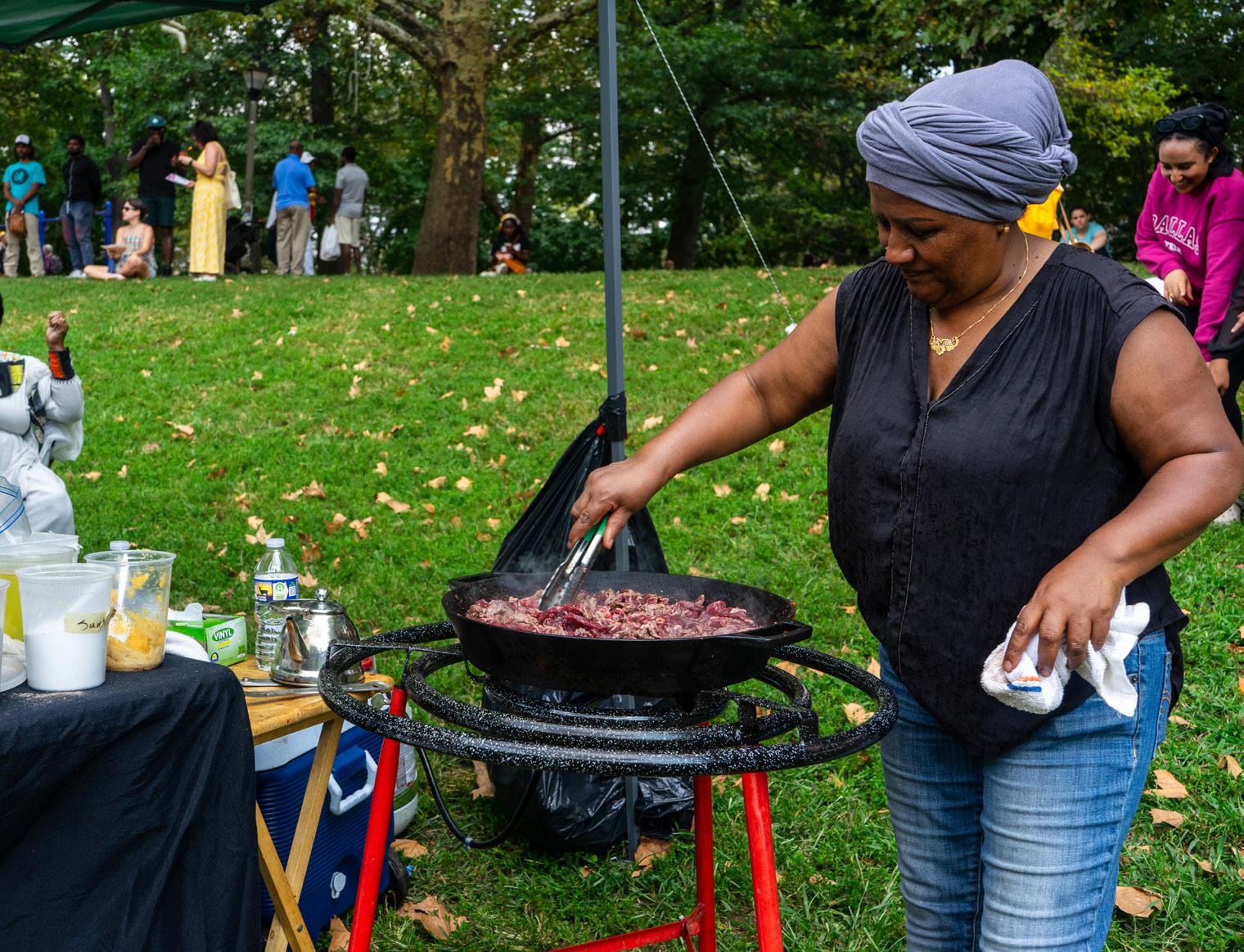
Attendees gathered, drawn in by the music, aromas and energy in the park.
BY BRIAN NELSON Photo Editor
The 41st Annual Ethiopian Day Festival transformed the typically tranquil landscape of Clark Park to an oasis infused with Ethiopian food, dance and pride in West Philadelphia on Sept. 6.
The park, known for its winding paths, shaded benches and wide green spaces, became the vibrant setting for a celebration marking the Ethiopian New Year, a cultural event honoring heritage, community and renewal.
As midday approached, the Clark Park Bowl, a valley of ample green space, flled with anticipation. Vendors completed the fnal touches on their stalls, carefully arranging traditional garments and preparing aromatic dish-
es that would soon fll the air with the scents of Ethiopian cuisine.
The festival commenced with opening remarks from Ephraim Kaba, president of the Ethiopian Community Association of Greater Philadelphia. Kaba, who led the organization of this year’s event, emphasized the importance of honoring Ethiopia’s founding history and instilling a sense of cultural identity in younger generations.
“This is a time for us to continue strengthening one another through celebration,” said Councilmember-at-Large and Minority Leader Kendra Brooks, who attended the event.
Following his address, the celebration ofcially began, and attendees started to gather in growing numbers, drawn in by the music, aromas and energy emanating from the park.
Vendors displayed handmade Ethiopian traditional attire and merchandise, many imported directly from abroad, while food stalls served a steady line of
attendees. The menu featured Ethiopian fare like Tibs, sautéed beef or lamb seasoned with regional herbs and spices — and Kitfo, a fnely minced beef delicacy.
Nearby, a refreshment stand ofered a selection of non-alcoholic fruit drinks, traditional cofees and biscuits.
Traditional garments imported from Ethiopia were also available for purchase. Among the vendors was Mulu Aman, a West Philadelphia resident and organizer with the ECAGP. Her table showcased an array of authentic cultural attire, including lacework, handwoven shawls worn during religious ceremonies and Shema — a handmade cotton cloth used to make the Habesha Kemis, a dress traditionally worn by women on special occasions.
The Ethiopian Day Festival served not only as a celebration of the Ethiopian New Year in the United States but
also as a means of supporting communities back home.
“Instead of asking people directly for money, we try to sell these things, and whatever benefts we get, we send them back home,” Aman said.
The event held personal meaning for Councilmember Jamie Gauthier of the 3rd District, a sponsor of the festival.
“I’m the daughter of an immigrant,” Gauthier said. “I wouldn’t be here without my mother’s story.”
brian.nelson0003@temple.edu




A student refects on their changing relationship with their mother after becoming an adult.

BY BRADLEY MCENTEE Copy Editor
I almost grew up without a mother, which is a hard truth for anyone to grapple with. About four days ago, I watched her turn 50 years old.
For the frst years of my life, she was in and out of hospitals because of complications with her C-section. On the nights she was allowed to come home, she always had new tubes hanging out of various body parts.
I don’t remember much from that period, but there’s one image I’ve held onto for nearly 18 years. I was standing outside the bathroom as she begged me to brush my teeth. I looked up at her, with her thinning hair, eye level with the JP drainage bag displaying her innards.
She went through hell after delivering my twin and me. She lost count of how many times she went under the knife and sufered for long stretches of time where an IV was the only thing supplying her nutrients.
The physical repercussions of those years still plague her today. She can’t lift heavy objects without nearly tearing a muscle in her core and something as simple as drinking water with a meal will cause a ft of nausea or vomiting.
Despite everything, she’s repeatedly told me she would endure it all again because of the lessons she learned and the reward of being a mother. Her frailty helped her realize how fraught the human experience is. Tragedy can strike at any time, and she better have the strength in her legs to run when it does.
With her second chance at life,

she knew she needed to make changes. She left the marriage she was unhappy in, delving further into her passion for motherhood.
Growing up, our relationship was complicated. I loved her deeply, but as I frequently remind her, she was uptight.
There were days I didn’t want to tell her about a mess I made in the kitchen out of fear of reprimand. I forged her signature on negative behavior reports from school to not tarnish her view of me.
Regardless of my anxieties, I knew she still loved my sister and me. She welcomed me with open arms when I went to sleep in her bed at three in the morning. She heard my one-of comments about wanting posters in my room, then surprised me with an elaborate display of “Harry Potter” pictures on my wall while I was at dance class.
As an adult, I’ve learned to cherish those positive memories more than I did when I was a kid. Despite my gripes about her helicopter parenting style, I can’t hold contempt for it. Because in her rebirth after the surgeries, she was
navigating who she was as a middle-aged woman while learning to parent.
We were facing the uncertainty of life in tandem, building better versions of ourselves from the ground up.
Through all the confusion she remained resilient. She worked upwards of four jobs at once through my childhood so I could graduate college debt free. When emergencies reared their head, she grit her teeth and tackled them head on.
After I turned 18, our relationship shifted completely. She became a friend. Since I was an adult, she no longer hovered around me. She let go of the reins, said I was free to make my own mistakes, and she would be there with loving arms to pick up the mess left behind.
We began to gossip about each other’s lives, our friends and enemies. Through our extensive talks in my adulthood, I’ve learned the nitty-gritty of her mistakes, the nights she wishes never happened and the triumphs in between. She is home to me.
The best part about being an adult
has been watching a completely new version of my mother emerge. With her two kids being self-sufcient, she fnally opened herself up to romance again.
For the last two years, I’ve watched her fall in love. She’s been married for more than a year, and I’ve been an onlooker to her relationship in all stages: the mess, the tender, the silly. Seeing it all unfurl has been the greatest gift of all.
She’s taught me what it means to be a fully formed person. She’s shown me the ugliness and the rebuilding that must come when everything’s burned to the ground. Ashes, though, can be washed away and something better can always be built in their place. I’m reminded of that just by looking at her face.
Joan Didion wrote in “Blue Nights,” “I do not know many people who think they have succeeded as parents.”
I hope my mother can realize she has.
bradley.mcentee@temple.edu
I
I
I P N J J X B Q E P A B J S G A G V H A
N K K Q E J G I F W B S A N G C E X B A
I E V R J V A N Y W A F V G H S M T R F
F S X G I D G A H P G V I A E Y I V K D
R
D
I
N K K Q E J G I F W B S A N G C E X B A
N K K Q E J G I F W B S A N G C E X B A
H T R A R T U I N P H B X F E G U H J E
I E V R J V A N Y W A F V G H S M T
F Q Q L S I B T E Y U O L O Q V D F O M
G Y Q O T T G L I S T V Z J X C S H Z P
H
P J T Y M R A G J S S Z S M F Y U S E A
H
G Y Q O T
A K S U Q Z U J B G D V B R Z F Z M Z J
N U A N R D F J C U T K E A S T U P I O
K K X K C U R W X T C U V N B U G C F G
R D F J C U T K E A S T U P I O
S V B M H V C C V J L K I C E V W M Q T
K K X K C U R W X T C U V N B U G C F G
S V B M H V C C V J L K I C E V W M Q T
O T Y I A N N C T G P V S M B L E P Z P
O T Y I A N N C T G P V S M B L E P Z P
Q C S R W Y L H R V R R R B M Z E K C D
Q C S R W Y L H R V R R R B M Z E K C D
N U H Y E J G B I X S O O S C W G V V T
N U H Y E J G B I X S O O S C W G V V T
J Y Q O R H M F S A T P N H E N B L E S
J Y Q O R H M F S A T P N H E N B L E S
H S Z S W P K S R N Z R N F Y L K A T N
H S Z S W P K S R N Z R N F Y L K A T N
Seven Eleven Starbucks Bagel Shop
Bagel Hut Richies Saxbys
Seven Eleven Starbucks Bagel Shop
Seven Eleven Starbucks Bagel Shop
Seven Eleven Starbucks Bagel Shop Bagel Hut Richies Saxbys Dunkin Hanks Brood
Dunkin Hanks Brood
Bagel Hut Richies Saxbys Dunkin Hanks Brood
Bagel Hut Richies Saxbys
Across
3. The "breakfast of champions"
Down
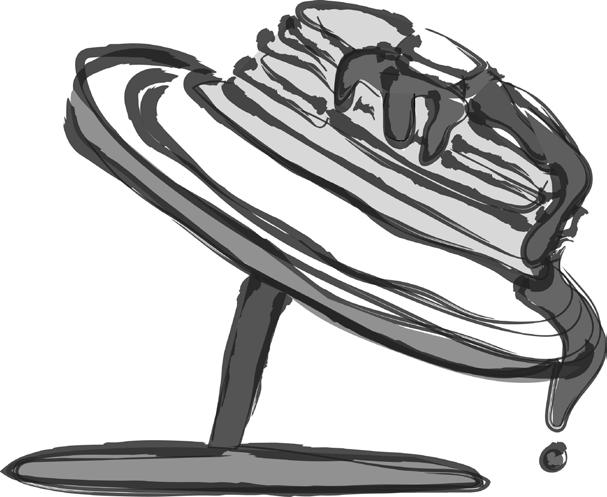
Dunkin Hanks Brood
5. McDonalds' most popular breakfast item
7. The traditional shape of a croissant
8. Espresso with steamed milk and milk foam
9. British term for a traditional full breakfast
10. Philadelphian breakfast delicacy made of fried pork
1. Chain restaurant Lana Del Rey famously worked a shift at
2. _______ Tuesday, a popular day to consume pancakes in typically February
4. The reason why The Breakfast Club was at school on a Saturday.
6. Where huevos rancheros originated
8. Breakfast food named after the Roman goddess of the harvest, Ceres
11. Average human consumes 173 of these per year

Junior advertising major Liam Katz has performed comedy for more than eight years.
BY MADELYNNE FERRO Features Editor
Liam Katz distinctly remembers the frst time he wanted to emulate a stand-up comic. He was listening to a Jim Gafgan joke about crabs being the “insects of the sea.” Gaffgan’s 2014 comedy special “Obsessed” gave Katz his own obsession, spurring the then nine-year-old to furiously pursue comedy.
By the seventh grade, Katz headlined a gig using his own material with an audience of more than 200 people: his school’s end-of-year talent show.
“Eighth grade, freshman, sophomore, I did them every year,” said Katz, a junior advertising major. “Junior year, I won the talent show. I guess the singers weren’t good enough that year.”
The 20-year-old comic has been writing and performing material for nearly half of his life, steadily performing in the Philadelphia comedy circuit since his frst gig outside of school at Catch a Rising Star comedy club in Princeton, New Jersey in 2022.
Most recently, he has traveled to New York and Chicago to perform and hosted shows at Temple through his club, The TU Mic. Katz started the club after transferring to Temple from Rider University in January 2024 and has hosted fve shows with a plethora of comedians since October.
“I would meet people and hear, ‘I don’t want to go all the way to Center City,’” Katz said. “I was like, ‘Okay, I’ll bring the comedy to them.’”
Katz feels the club solidifed his place in Temple’s community. The comedian works relentlessly to fll the crowd for shows, handing out fyers for upwards of eight hours on campus to drum up a crowd.
The student body, however, isn’t always receptive to the hustle.
“I get told to ‘f--k of’ sometimes,”

Katz said. “A lot of times I’m biased, I’ll give it to one girl instead of a group of people. They usually say no. But then I tell myself that my wife wouldn’t say no to a free comedy show, so she’s not the one.”
Katz has also found success at private shows, performing for graduations and corporate events. Private events put money in his pockets but stretch his material, leaving the comedian comfortable with performing the uncomfortable.
Going into his eighth year in comedy, Katz can refect on past mishaps with humor. He’s learned to cope with the occasional bomb and uses the blunders to improve for the next show.
“It sucks,” Katz said. “A lot of people blame the audience, but it’s like anything else. You have of days; I try to use the chance to see what I could do better next time.”
Mel Harris, a fellow Philadelphia comedian, has performed with Katz across
the city and was a featured performer at the Feb. 26 TUM show. Harris noted his amazement at the 300 students coming and going from the on-campus show.
He was also impressed by Katz’s maturity on stage.
“Liam’s just diferent,” Harris said. “He’s very worldly and at his age, that’s crazy, because you haven’t really experienced everything yet.”
It was at the February show that Harris met Katz’s grandfather, Harold, attending like he does most of Katz’s performances: dressed in a security jacket.
The Katz family is extremely supportive of Liam’s career and boasts of their own Temple accomplishments. Katz’s father, Joel, was a DJ at WRTI, Temple’s classical and jazz broadcast radio, during his undergraduate time at Temple and his grandfather graduated from Temple with a marketing degree.
Harold’s most recent claim to fame
was getting pulled on stage by Liam to perform a joke. Harold fnds similar personalities between himself, his son and Liam’s father Joel Katz, and Liam.
“He’s always been a funny kid,” Harold said. “He gets better every year. He’s very creative, especially with the writing.”
Katz hopes eventually to settle in Newtown, Pennsylvania with his family and make a living of comedy. For now, he’s more than content being the campus comedian.
“I’ve kind of built my own little community,” Katz said. “Some people don’t even know my name. they just call me the comedian.”
madelynne.ferro@temple.edu
Temple’s LGBTQ organizations foster support in a time of federal backlash to their community.
By BEN DIPALMA Assistant Features Editor
For years, Jasper Ragan struggled to fnd a community that was right for him. After transferring to Temple as a junior, most people already found their own group of friends. He became involved in Pitch Please, an LGBTQ advocacy acapella group on campus, he knew that he had fnally ended up in the right place.
“Pitch Please was so accepting and lovely,” said Ragan, a senior liberal studies major. “It provided a place for me to express myself completely freely. It’s so important to me because I don’t always feel the ability to do so.”
Pitch Please currently has around 17 members and holds weekly meetings. The organization ofers a welcoming space for LGBTQ students to meet, socialize and hold acapella performances that feature some of their favorite songs.
LGBTQ advocacy clubs like Pitch Please provide community during a critical time for the queer community in the United States.
The Trump administration ended the suicide prevention hotline for LGBTQ youth with a July executive order, a move that comes at a time when hostility toward the queer community has been on the rise, and federal attacks against Diversity, Equity and Inclusion at universities around the country have dwindled available options for students to get access to crucial pro-LGBTQ resources.
Alex Thomas is the president of Queer Student Union, the oldest registered LGBTQ student organization at Temple. QSU has 10 members and frequently holds PowerPoint nights, hosts karaoke, plays bingo and eats pizza together.
“Our club is a social space for queer students and allies on campus,” said Thomas, a junior political science major. “It’s basically a place for people to

hang out with each other, make friends and connect with other people in the LGBTQ plus community.”
QSU is just one of several LGBTQ-inclusive organizations on campus. Queer People of Color, Pride Professional Network and Feminist Alliance are other major organizations listed on Temple’s Institutional Diversity, Equity, Advocacy and Leadership Department website.
The IDEAL department hosts events throughout the year for LGBTQ students like its National Coming Out Week program in mid-October, which brings support and awareness to the LGBTQ community through panel discussions, guest speakers and a festival on campus.
As more students are looking to get involved in spaces that they feel accepted in, club organizers aim to ramp up their on-campus presence. The goal is to create more spaces where students feel comfortable and ofer guidance to those who may feel uncertainty over the direc-
tion of national policy.
Alexander Miller is a junior computer science major who reintroduced Honors Queers this year after it went inactive during the COVID-19 pandemic. Miller decided to bring back HQ after it received large demand from students who felt that the honors program lacked LGBTQ representation.
The organization currently has around 30 members and is hoping to bring on even more members to expand further throughout the school year. This year, HQ plans to host movie nights, thrifts to provide gender-afrming clothing and bring in speakers from the queer community to talk about current events.
“Having these safe spaces reminds people that you are welcome, you are loved and you are appreciated,” Miller said. “I think that’s super important with everything that’s been going on.”
Community building is frequently a central goal of the university’s LGBTQ
organizations. Club organizers want students to feel free to come to a meeting and get involved, but most importantly they want students to fnd a place where they feel comfortable on campus.
Despite the anxiety that queer students may feel right now, club members like Ragan want them to know that they still have a space where they can feel welcomed.
“Queer joy and making sure that people know that there are places where they can be fully accepted and be fully themselves as well as fnd connection and community is so, so, so important,” Ragan said. “I’m really grateful for this club, and I’m even more grateful to spread the word to other people that might not know about it.”
ben.dipalma@temple.edu
Garis Eddington plans to open with renovations and employ within the Temple community.
BY MADELYNNE FERRO Features Editor
For Emma Gray, The Peabody has been an idle establishment. The senior health professions major walked by “opening soon” signs every day on her way to class but saw no progress throughout the three-year delay.
When the bar fnally opened in February, it closed barely a month later. The Peabody has slipped from bar reality to a nightlife pipedream for many students like Gray.
“I remember so many months of everyone saying, ‘When is this going to open?’” Gray said. “But the signs just stayed the same.”
Glu Hospitality, the previous owners of The Peabody, ofcially shut down operations on March 19 amid multiple lawsuits, wage theft allegations, and a Pennsylvania Department of Labor investigation. A new owner,
O I C E S


Garis Eddington, took control in June and has slowly been renovating the space, aiming to open the bar in late September or early October.
Eddington had no relation to the former hospitality group, but this type of “bar rescue” is commonplace in the food and beverage industry, he said.
“The Peabody used to be the Draught Horse back in the day, I remember it from when I was [working in the area] in 2013,” Eddington said. “It was a great opportunity for me to bring some life back into a spot that used to be very popular.”
Eddington is the founder and Director of Operations at Fork Lobby Hospitality Group and has experience in abandoned bars and restaurants like the Peabody. Eddington’s main focus was modifying the layout and overall fow of the space.
He hopes to elevate the bar to a campus staple and fll the void left by Draught Horse’s closure four years ago.
“There’s a relationship we want you to have when you come in there,” Eddington said. “Where you feel proud that we want to have you.”
Eddington looks to return the venue to a multipurpose space. During renovations, he added a 60-foot jumbotron to host watch parties and a glass-enclosed room for private events.
Tyler Whatley, a 2025 public health alumnus in the accelerated nursing program, noted the bar’s disorganization last year. He felt the bar was understafed and the wait for drinks was unreasonably long.
“The bar was always packed,” Whatley said. “The two bars along that street were Pub Webb and the Peabody, so we would alternate between. The Peabody was defnitely unorganized.”
Whatley usually goes to Center City for nightlife, as the limited amount of campus bars restricts options.
“I probably won’t be going much, if at all,” Whatley said. “A lot of my friends graduated, so a lot are in the Center City area. I doubt they would want to go back here to go to the Peabody.”
With Temple’s limited bar scene in mind, Eddington is prepared to revitalize campus with the nightlife destination. The bar has a month before opening and is still hiring, aiming for 70% of
workers to be associated with the Temple community.
Eddington also plans to host internships in marketing and branding at the bar, pulling directly from the Temple student body. He intends to insert students in vendor relationships and development programming to develop tangible skills.
Until then, Eddington is ready for The Peabody to shed its old image and bring new life to a Temple-focused space.
“When there’s an experience, people claim that location,” Eddington said. “I want the alumni, I want the faculty, I want the student body. I want the future student body to say, ‘I can’t wait to fnally go to that place called Peabody.”
madelynne.ferro@temple.edu
Question?
DO YOU THINK TEMPLE FOOTBALL WILL CONTINUE THEIR WINNING STREAK?
Freshman sports media major | He/him
“ We’ll see how it goes next week. Going against Oklahoma, that’s a real test. ”
Freshman psychology major | She/her
“ They better. It’s my frst year, so they got to do it for me. ”


Senior journalism major | They/them
“ I don’t want to jinx it, but I’m staying positive. ”
Junior marketing major | She/her
“ I don’t know much about football, but I know I want them to win. ”
The Temple News
FOOTBALL
The Owls are off to their best start in six years, but staying competitive remains in question.
BY COLIN SCHOFIELD Co-Sports Editor
Temple is of to a historic start in 2025. The team is putting up numbers they haven’t seen in years and it looks like both ofense and defense are connecting on every facet of the game.
The Owls scored 97 points through their frst two games, their highest start to a season since 2011. They are unbeaten through two consecutive games to start a season for the frst time since 2019 and won their frst road game since 2021.
The start of the K.C. Keeler era has been everything fans could have hoped for, but they are yet to face a real challenge.
Games against UMass and Howard gave Temple an opportunity to get its feet wet and answer some roster questions. However, neither opponent offered the highest level of competition, so the Owls still have plenty to prove heading into the toughest stretch of their schedule.
“We have some tough games in front of us,” Keeler said. “But the frst two weeks, to handle our business like we’ve handled it, I think it’s really positive.”
There have been plenty of positives in Temple’s frst two games. Quarterback Evan Simon’s nine touchdown passes surpass his eight incompletions this season. Jay Ducker and Terrez Worthy have given new life to the run game along with a vastly improved ofensive line. Ducker’s 215 rushing yards are nearly half of Worthy’s total last season when he led the team in the stat.
The defense has been equally impressive, allowing just 17 points and forcing three turnovers through two games. However, despite all the gaudy numbers, the Owls’ success has come against low-tier opponents that have not fully shown the type of performance they could have against stronger teams. They opened the season at UMass

and while Temple fnally broke its road losing streak, it was against one of the worst teams in the FBS. The Minutemen have not had a winning season since 2010 and have only picked up seven total wins since the calendar fipped to the 2020s.
Temple’s second opponent was Howard, who competes at the FCS level, a tier below the FBS level where the Owls compete. The Bison have only had four winning seasons since the new millennium and have not had one since 2017.
Temple steamrolled Howard 55-7 on Saturday, but Keeler made sure his team didn’t think of the Bison as just an FCS team.
“I thought we did exactly what we were supposed to do,” Keeler said. “And the great thing was I told the team this in the locker room, there wasn’t a single point through the course of the week that I had thought we were going to play an FCS school.”
While the Owls’ recent victories are encouraging, they do not change the fact that their opponents were a step down in competition. Temple still needs to hold its ground against better teams to prove they are true contenders in the American Conference.
Temple will be tasked with taking on No. 13 Oklahoma, who is coming of a win against No. 23 Michigan. The Owls lost to Oklahoma 51-3 in last year’s season-opener but now will face the Sooners with a pair of wins under their belt and a newfound confdence.
The Owls need to overcome more challenges in the young season, but there are also plenty of things to like about the way they have played.
There is a diferent aura surrounding the team compared to previous years. The locker room is built around Keeler’s culture reset. Simon has taken command of the ofense and he showed the team has plenty of weapons to distribute the ball to.
The fast start is exactly what Temple needed to open the season. The Owls had two very winnable games to begin the year and they took care of business in both. The results are encouraging and things are pointed upwards for the frst time since the mid 2010’s.
Temple still has a lot to show from a competitive standpoint even after cruising its way through two games. They are beating the teams they are supposed to beat, which is what good football teams do. Now they have to remain competitive against tenacious teams on the schedule.
“Right now, it’s all coming together,” Keeler said. “We know the next test is going to be very unique and much different, but I think for what we had to do the frst two weeks, I think we should be pretty pleased with where we are going and hopefully, we can continue to grow.”
colin.schofeld@temple.edu @ColinSchofeld9
Alyssa Finister wants to be a calming presence for her teammates in her senior year.
BY SIENNA CONAGHAN Co-Sports Editor
Alyssa Finister’s frst love wasn’t volleyball, or a team sport at all. She frst dipped her toes into the world of dance when she was just three years old and didn’t stop until the eighth grade. She dedicated 11 years of her life to ballet — but grew tired of dancing on her own.
The culture of team sports intrigued her: Finister tried volleyball in middle school but was still unsure if she wanted to continue playing. It was the enjoyment of being around her teammates that stuck with her and she decided to try out for Houston Juniors Premier in Houston, Texas in 2020.
She followed it to another level after a club coach told her she had potential in college. She is now using her love for a team to be a stable leader for the Owls in her fnal season of college eligibility.
“Being someone that everybody can depend on on the court, especially in those tight times [is the goal for this season],” Finister said. “I want to be reliable, not just as a leader on the court, but blocking, hitting, all that stuf. Always having a steady, ‘We could count on Alyssa for these things.’”
Finister started her collegiate career at East Carolina in 2022. She endured mild success with the Pirates, appearing in 31 matches during the 2022 and 2023 seasons, where she tallied 87 kills and 82 blocks. However, she only had a scholarship for two seasons, so she decided to fnd a diferent opportunity heading into the 2024 season.
She found a new chance at Temple, a fellow American Conference member. Head coach Linda Hampton-Keith admired Finister’s composure and athleticism and wanted to bring her to North Philadelphia.
Finister joined the Owls in Fall 2024, losing the chance to utilize the ofseason to adjust to her new program. She got comfortable as the year continued and took advantage of the following
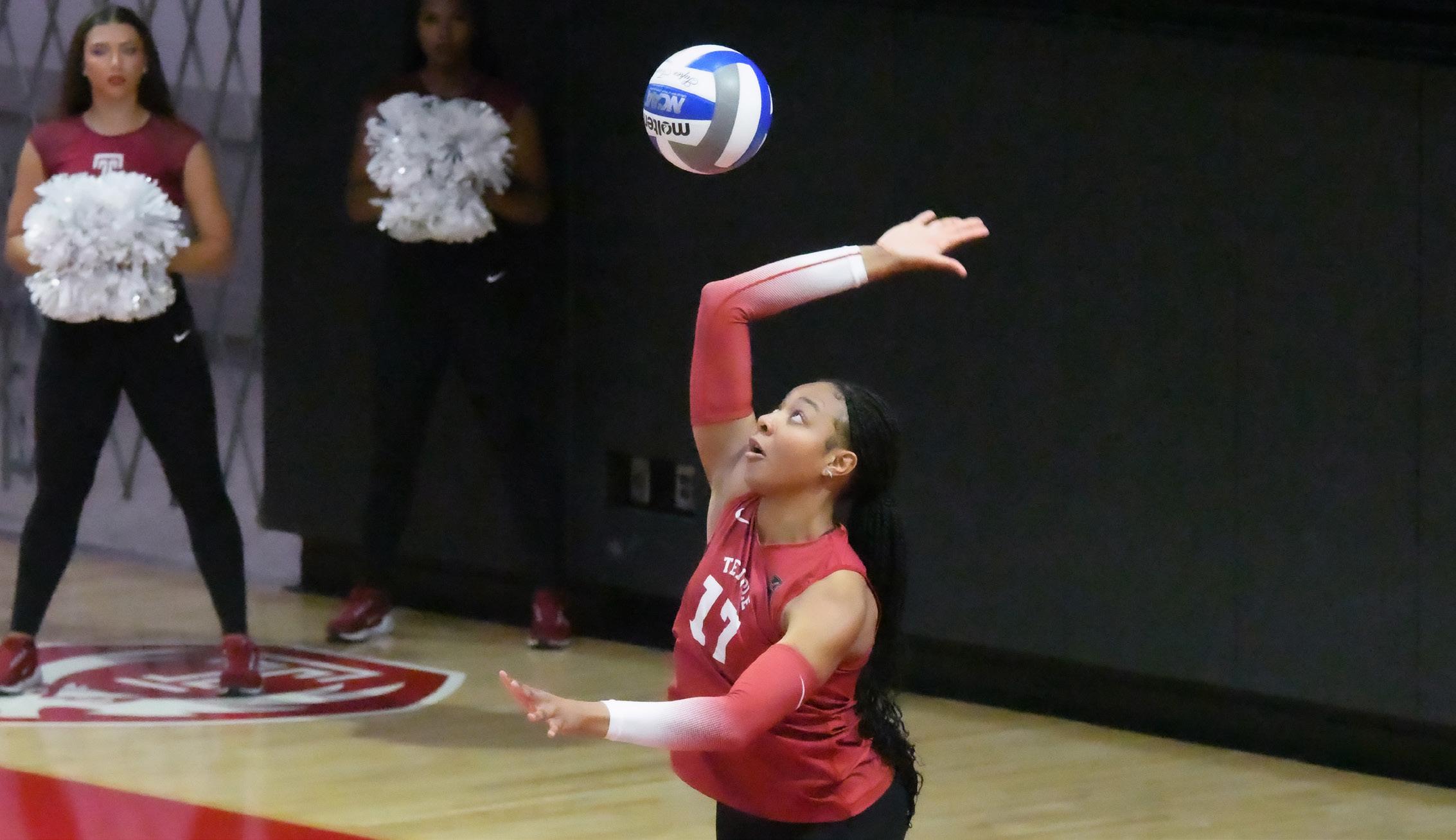
ofseason to develop her skillset.
Once Finister got to North Broad Street in 2024, she carved a role for herself despite missing the ofseason for preparation. She started 22 of Temple’s 30 matches and fnished the season second on the team in blocks with 65 and fourth in kills with 157. She worked to develop her skillset following last season and her goal is to step up even more and make signifcant contributions at the net.
“She’s been doing just such a great job for us, in terms of putting some work in, really being invested and getting better each day,” Hampton-Keith said. “Last year we talked a lot about, ‘Hey, she’s got so much potential and she’s doing some really good things for us,’ but then she would kind of air out a little bit. And so, she’s doing such a good job of really stabilizing us and taking over that middle role.”
Most of the Owls’ roster this season are freshmen or transfers. Finister recalls feeling lost when she frst arrived
at both ECU and Temple, which spurred her to ensure her teammates know they can rely on her.
Middle blocker Katie Hickey transferred into Temple the same time as Finister and she took immediate notice of Finister’s caring nature.
“She’s put a lot of the younger girls before herself, especially the girls in our own position,” Hickey said. “I feel like she makes sure that they get what they need frst before she gets what she needs.”
Finister has a calming presence about her that she uses to help her teammates remain composed during matches. The mindset wasn’t easy to achieve, but it’s something she’s committed to maintaining. She has dedicated time to staying confdent even if things aren’t going well on the court.
She’s able to keep that energy by acknowledging her errors without letting them afect the rest of her game. Finister pinpoints what she needs to focus on in the moment and then moves forward, to ensure her teammates don’t get too high
or too low. Her priority is to focus on the next point.
“I would say the biggest [improvement] was probably the mental aspect of the game,” Finister said. “I need to be that for the younger people too, being confdent and not freaking out on the court. I think before sometimes I would doubt myself and that would cause me not to play as well. But now I try to stay cool and confdent, not just for myself, but for everybody on the court.”
sienna.conaghan@temple.edu @Sienna_Paige2
FOOTBALL Wide receiver Colin Chase needed just three months to earn a single-digit.
BY COLIN SCHOFIELD Co-Sports Editor
When Temple’s staf began their nomination process for single-digits, there was one name no one predicted in the mix. He became everything the coaching staf expected on and of the feld, ftting all the characteristics of what a single-digit player should exhibit. But there was one glaring issue.
The player arrived on 10th and Diamond three months prior. Head coach K.C. Keeler didn’t want to force a player with such a short tenure into a high caliber role. Still, his lack of experience at Temple did not matter to the rest of the Owls, as they voted for him in overwhelming numbers.
This mystery player was Colin Chase.
Chase was named a single-digit on Aug. 20, due to his display of exceptional leadership qualities as both a player and
CONTINUED FROM 20 FIELD HOCKEY
“You don’t get to really choose who you come in with,” Rieger said. “You just get lucky. From freshmen who don’t even know their way around campus and just trying to fgure out how you mesh with the team and then just being able to grow with each other.”
The three had to adjust to a faster and more physically demanding brand of feld hockey when they frst got to Temple. However, they quickly adapted and earned a role for themselves in their frst year in the program.
The trio worked together and played of each other’s strengths to evolve their game. Their improvement has been evident to Vittese, who has watched them develop into leaders committed to ele-
teammate. He has carried himself as a single-digit his entire career and is expected to be one of Temple’s top receivers this season.
“I put my head down and grinded,” Chase said. “Wherever that took me, I was going to be myself. I wasn’t going to try to be anyone else. I was just going to do what I do and if my teammates and coaches felt like I earned [a single-digit], then I would have gladly accepted that.”
The single-digit is a longstanding tradition at Temple, where players who exemplify the “Temple TUFF” mantra are rewarded with a single-digit jersey number. A single digit has to be earned, not given, which Keeler hammered home when he was hired.
Chase’s work ethic has defned his career and led him to Temple. However, the path there was anything but straight and narrow. Chase committed to St. Thomas out of high school and excelled. He spent three years with the Tommies to grow into one of the Pioneer Conference’s best receivers.
He earned frst-team all-Pioneer Football League in 2024 after totaling 37 catches for 633 yards and six touch-
vating the program.
“I would say the combination of those three is not only like their on-feld impact, who they are in the locker room, who they are in their relationship with staf,” Vittese said. “Part of what makes their leadership work is how diferent they are. Each captain brings her own style to the role, creating a balance that has carried the team through highs and lows.”
Each captain brings a diferent leadership style that gives them a chance to contribute in diferent ways. Aschenbach is a calming presence, often providing stability during tense moments. Rieger brings energy and enthusiasm that lifts the team, while Tucceri’s competitiveness drives everyone to improve.
The captains connected with their teammates, building trust and open communication just like previous leaders of the team have done in the past. This has been pivotal to building a culture of ac-
downs. He jumped in the spring transfer portal, where Temple began to recruit him. His flm caught the eye of wide receivers coach Roy Roundtree, but what stood out more was the professional way he conducted himself on the phone.
“I was really amazed the way that he interviewed me,” Roundtree said. “I think that took it to a diferent level, just his knowledge and his IQ of a college football player. It’s very rare that guys get on the phone with a position coach to ask ‘Hey, why are you recruiting me?’”
Chase committed to the Owls on April 30 and impressed in scrimmages and drills during fall camp. He quickly established himself as one of the Owls’ best receivers.
But he also left his mark of the feld.
Chase quickly engraved himself in the Philadelphia community. He gave back through participating in city-cleanup events and volunteering at a kid’s camp and an ice cream shop. His community service caught the attention of Temple’s locker room and was a major factor in him earning a single digit.
“Colin Chase, even though he got here in June, was one of [two] guys who
countability that has been carried since they frst joined the team.
They have remained united, even in disagreements, to bring out the best of the team. Through adversity, tough losses and high-pressure games, they have pushed through together. Their resilience has guided the team to crucial wins like knocking of Old Dominion in the Big East semifnals last season.
“It’s been a journey,” Tucceri said. “Because I’m someone that struggles with attitudes sometimes. [But] they also got me to see that part of me and hold me accountable for it. So, we all see each other’s faws and we work through that.”
While this season is their main priority, all three captains are focused on the legacy they will leave behind. They have been a part of the program’s elevation and have worked to make sure it is in good hands when they depart.
Vittese credits Aschenbach, Rieger and Tucceri for catapulting Temple from
got 50 hours of community service,” Keeler said. “That’s who he is and that that was an easy call.”
Earning a single digit exemplifes how Chase has modeled himself as a player and person. He worked relentlessly and carried the same mindset to Temple. While Chase may hold the weight of a single digit, the title is not going to change how he operates.
“I guess nothing really changes,” Chase said. “You get the responsibility of being a single digit, so your players are gonna expect you to be at your best every single day and that’s what I’m going to do.”
colin.schofeld@temple.edu @ColinSchofeld9
being ranked in the mid-50s and 60s in the NCAA four years ago to 28th entering the 2025 season. That success is something they hope will continue as the team will strive for a championship.
They have been through thick and thin during the last few years, but the trio’s journey is nearly complete. The three who started as uncertain freshmen are now seniors who have helped shape the path for future players.
“That is their legacy. I mean, brick by brick, they kind of crawled us out of this hole where we previously were,” Vittese said. “And that’s so important and it helps me do my job. It helps the staf do their job. They have made this program way better than they found it. Do you want to leave it better than you found it, or worse? Every day, they continue to do that.”
ashley.lovelace@temple.edu @Hidden_Verse


Peyton Rieger, Augustina Tucceri and Halle Aschenbach joined the Owls their freshman year and now serve as leaders.
BY ASHLEY LOVELACE
For The Temple News
Defender Halle Aschenbach and midfelders
Peyton Rieger and Augustina Tucceri joined a Temple team that was rich in tradition in 2022. Head coach Michelle Vittese had turned the Owls around, with culture setters in backs Alizé Maes and McKenna Burkhardt and midfelders Tess Muller and Devin Kinzel.
each became captains during their tenure at Temple and Rieger, Tucceri and Aschenbach admired them as role models.
However, the 2025 season brought a change after these four pillars of the team graduated. It was up to the three new seniors to step up in their place. That experience waiting and learning has come full circle this season.

Maes, Burkhardt, Muller and Kinzel turned Temple into a perennial Big East powerhouse and became the backbone of the program. They
Rieger, Tucceri and Aschenbach were each named team captains before the season started. Each of them displayed impressive growth during their time in the program and they have been key members of the team since 2022.

FIELD HOCKEY | 19
